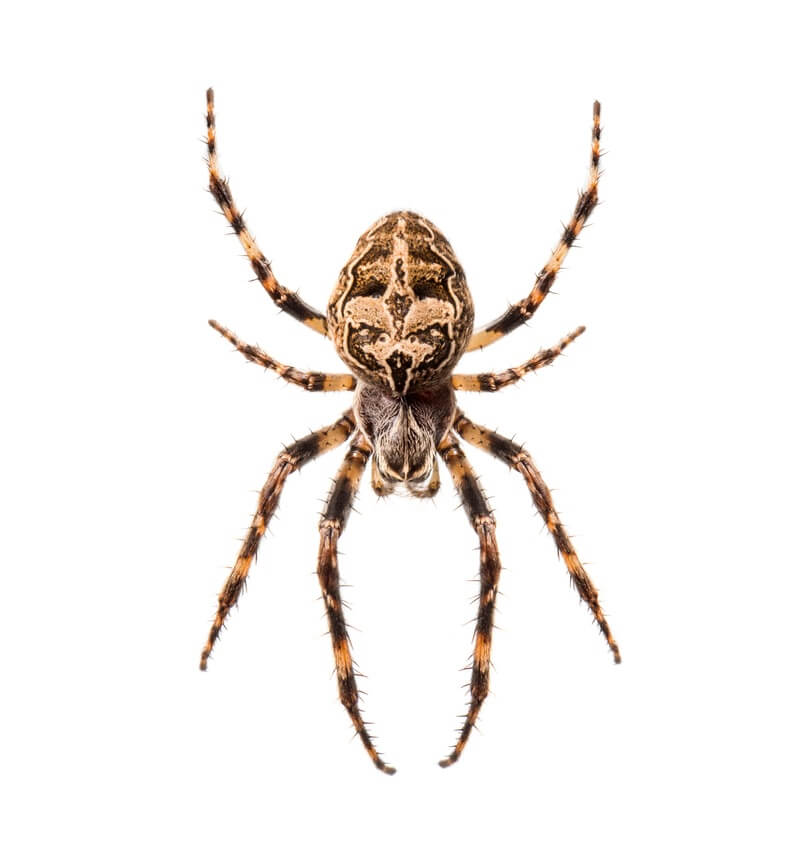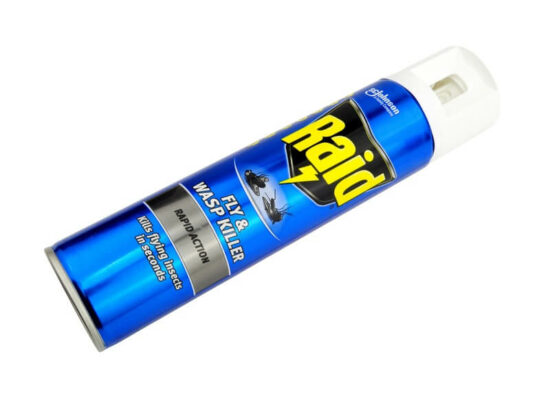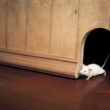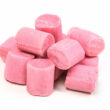Using Raid and other wasp sprays to kill spiders is a method that many homeowners don’t consider. Instead, they stick to swatting at spiders with random objects they find in their home.
But will wasp spray kill spiders? And if so, how effective is it?
This guide covers everything you need to know.
Table of Contents
Will Wasp Spray & Raid Kill Spiders?
Spiders are one of the most intimidating pests you can come across in your house. These eight-legged creatures are the stuff of nightmares (for some) and are creepy enough to send any homeowner grabbing for the nearest weapon!
There are some 45,000 unique spider species in the world. Around 300 can live in homes. While some are innocent enough, others can bite, administer venom, and cause health problems.
There’s no shame in freaking out when you see a spider. But what should you use to kill them?
One common pesticide that homeowners have lying around is wasp spray. Spray from brands like Raid are incredibly popular. They’re also affordable and easy to source.
But does wasp spray kill spiders?
Wasp spray can kill spiders, but it doesn’t work in the same way it works to kill wasps.
The Reason It Works
Here’s a unique factoid that many people don’t realize: Spiders aren’t technically insects! They’re actually a type of animal called arachnids.
Expert Tip: Their biology is a little different from insects. As a result, wasp spray doesn’t have the same effect on these creatures as it would on wasps, roaches, and other common household pests.
First, let’s talk about what’s in wasp spray.
Most products like Raid have common pesticide chemicals. You’re most likely to see pyrethroids, imiprothrin, and cypermethrin. We won’t get into the technical details of these chemicals, but they’re pretty powerful against bugs.
When you spray chemical-laden solutions on wasps or near their hideouts, the chemicals quickly get into the bug’s system. It wreaks havoc on their central nervous system, causing death shortly after exposure. The cool thing about wasp sprays is that they often continue working even if you don’t spray the bug directly.

Spiders don’t have a closed circulatory system like bugs. It’s open, making it impossible to transmit chemicals to vital organs. For this reason, those chemicals don’t kill spiders the same way as they kill wasps.
Furthermore, spiders have a build that makes it easy to avoid direct contact with the chemicals. Their long legs keep their cores off the ground and away from any insecticides you spray.
So how do wasp sprays kill spiders?
To be effective, you must spray wasp spray directly on spiders if you want to kill them! When you do that, you essentially suffocate the spider!
The chemicals don’t attack the organs or central nervous system, but they will cause a lot of harm. The chemicals have a super-strong odor and typically burn the spider’s exoskeleton. There’s a reason why these products provide multiple warnings about skin contact.
It’s not something you want to get on your skin. Now, imagine what it’s like for a spider!
When you douse spiders in wasp sprays, they drown in the chemicals while attempting to hold their breath. Think of it as being covered in acetone or alcohol. It would burn your skin while also making it incredibly difficult to breathe.
Most spiders die a slow and painful death. While it’s not ideal to kill spiders this way consistently, it gets the job done.
Keep in mind that you have to get the spray directly on the spider to work. Spraying it near suspected hideouts won’t do the trick. Even if you douse their usual hangout spots, the spider will be unaffected unless you cover them in the chemicals.
The same goes for long-term protection. Wasp sprays aren’t going to do anything to kill large colonies or take care of the larger pest population. You can only use the spray to kill spiders you see on the spot.
How To Use Wasp Or Hornet Spray To Kill Spiders
Eradicating spiders isn’t easy. There are many ways to kill these bugs, and you often have to act fast not to miss your opportunity. That means you might find yourself grabbing your can of Raid or other brand of wasp spray in order to take care of the problem.
Here’s how to kill spiders with wasp spray.
1. Clear The Room
The first thing you should do is clear the room of all pets and people. Wasp spray has a strong chemical odor that can irritate your nose and throat. Not only that, but the spray can make tiny chemical droplets go airborne.
It spreads quickly, turning the area into a dangerous place for kids, adults, and pets.
Moving as fast as possible, clear the room and remove any food. If possible, open up a few windows for air circulation. The smell is worst when the chemicals get trapped in an enclosed space.
2. Give The Bottle A Good Shake
Before you start spraying, give that bottle a good shake!
Wasp sprays like Raid have a pretty long shelf life. They can sit in your garage or shed for years before you need to use them.
As you can imagine, things settle, and the various chemicals can separate. Shaking the bottle will ensure that the insecticidal chemicals mix accordingly, creating an effective formula to kill the spider.
After you shake the bottle, position the nozzle. Many people inadvertently spray these products towards themselves as they try to act quickly. This is a product you don’t want to get into your eyes, so make sure you’re pointing it in the right direction!
3. Saturate The Spider
When you’re ready, douse the spider! Don’t be afraid to saturate the spider and its web. Go to town and have no mercy!
Most spiders will attempt to scurry away. The best course of action is to catch the pest by surprise. Hit it hard and fast to get the spider as wet as possible.
If you’re lucky, you’ll spray so much that the spider can barely move. If that happens, it’ll likely curl up and wriggle in pain.
Some spiders manage to get under cover. However, they’ll likely slow down enough to hit them again from a different angle. Be cautious and use a flashlight to find the pest if necessary.
Douse the spider and thoroughly saturate it.
You might feel the need to cover up your nose. Use your shirt or hand to do so. As mentioned earlier, the spray will go airborne. Keep yourself protected as you kill the spider with Raid.
4. Let The Chemicals Air Out
After covering the spider in chemicals, leave the room immediately. Don’t worry: The spider isn’t going anywhere if you sprayed it enough.
Leave the room and close the door. Let the chemicals work their magic as the spider slowly dies.
It may take a few hours, but you should wait until the chemicals evaporate enough to make entering the room bearable. Keep all pets and kids out, too.
If you can still smell the chemicals when you enter, you didn’t wait long enough. Your safety and the safety of your family is the most important thing. Be patient and wait for that smell to subside.
5. Dispose Of The Spider’s Corpse
Once it’s safe, you can re-enter the room. Letting things air out a little more before you start using the space is best. But you can clean up the mess in the meantime.
Use some tissue to dispose of the spider’s body. This step is crucial. Many pets will go in to investigate the arachnid, and some may even attempt to eat it.
Of course, the spider’s body is laced with chemicals, so it will only cause harm if that happens.
Remove the body and toss it in the garbage. Remove any spider webs if they’re still standing.
6. Vacuum Thoroughly
The last thing to do is vacuum up any mess. While the spray will evaporate, it could leave behind some residue. You may also notice egg sacs or other remnants of the spider.
Vacuuming will pick up any leftovers. Give the room a good clean, and empty the vacuum bag or canister outside. Egg sacs could survive, leading to a growing spider population.
Wasp spray will not address infestations elsewhere in your house. It only works on spiders you can see and spray on the spot. So, keep the product on hand to kill any other spiders you might encounter in your home.
Are There Better Alternatives?
Not too keen on using wasp spray to kill spiders? Fortunately, there are some other alternatives.
The most obvious choice is a pesticide product formulated explicitly for spiders. While not as common as wasp sprays, you should be able to find some at your local big box store. Grab a can and have it on hand for better efficiency.
Of course, you can always simply trap or squash the spider. The latter option is the most humane, but it does come with some risk.
It’s not a good idea to get close to spiders that could be venomous. If you suspect the creature is a black widow or brown recluse, it may be better to grab some spray or call a professional exterminator.
Sprays give you the advantage of space. Catching or squashing is fine if it’s a small, non-venomous species. But it’s not ideal if you’re dealing with a spider that can do considerable damage.
Conclusion
Raid does kill spiders, but not in the same way that it kills wasps. While it’s not our go-to method for dealing with these eight-legged critters, it’s worth being aware of this option!
Let us know if you have any questions about using wasp spray to kill spiders. We’re more than happy to help.


